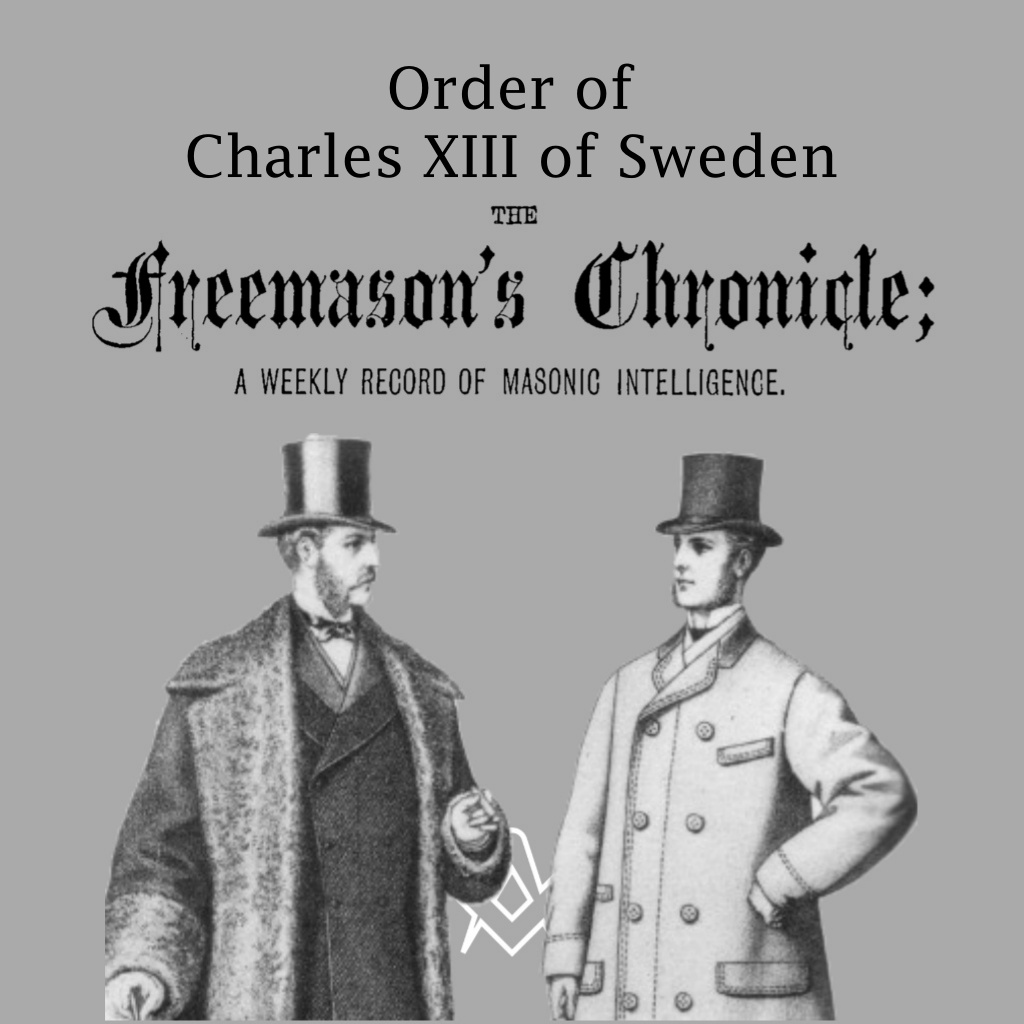Order of Charles XIII of Sweden
The following translation of the Manifesto of King JL Charles XIII of Sweden, on the occasion of his establishing the Masonic Order which bears his name, and of the Statutes of the said Order, may be interesting to our readers.
MANIFESTO
We, Charles XIII, by the Grace of God, King of the Swedes, Goths, and Vandals, & c, make known that among the cares which, under divine Providence, we have assumed in accepting the Crown of Sweden, not one is dearer to us than that of inquiring into and rewarding merit whose aim is to benefit the commonwealth.
We have seen that oar glorious ancestors and predecessors, animated by like sentiments, in renewing several ancient orders, strove to arouse their subjects to bold and patriotic acts, and bestowed some ostensible mark of honour on men of eminent virtue. If, not unfrequently, we confer reward on those who have shown themselves faithful, brave, intelligent, or industrious, neither must we overlook those good citizens who, in a narrower and loss brilliant sphere, and guided only by a desire to be of service to humanity, are secretly prodigal of succour to the distressed and the orphan, and who, in the form of refuges for the indigent, leave traces, not of their names, but of the benefits they have conferred.
As we are desirous of paying honour to these virtuous actions, which the laws of the Kingdom prescribe not, and which are but seldom brought under the notice of the public, we have been unable to withhold certain proofs of our special goodwill from that estimable Society in Sweden, which we ourselves have administered and presided over, the dogmas and institutions of which we have studied and propagated, of which for so long a period of time we have been the chief, and with which, in fine, we have invariably preserved such excellent relations, as will assure on the part of its members, now our subjects, both to us and to our successors to the Swedish throne, the fulfilment of all those duties which religion, fidelity, and attachment to the throne can demand of men.
In order, then, to confer on this body a proof of our good will, we will and ordain that its principal dignitaries, in such numbers as we shall determine, shall, in the future, receive the most conspicuous mark of our confidence, which shall be to them the distinctive sign of the highest dignity, and we make it known by these presents that those who shall receive it shall for the future be known as a body of Knights, under the name of Charles XIII, of which we ourselves shall be the Grand Master.
As in establishing this Order our purpose is not only to excite our subjects to the practice of beneficence, and to perpetuate the remembrance of its devotion to our person of that society when subject to our direction, but also to furnish proofs of our royal esteem towards those whom for so long a period we have embraced and looked upon Tinder the name of brothers; we have selected for the institution of this Order the day when our beloved son and successor, the Prince Charles John, hath taken upon himself, in conjunction with us, the general governance of the Society aforesaid.
We leave by these presents to him and to his successors to the throne of Sweden the care of maintaining and handing down this Institution in Sweden, in accordance with the following ordinances, which we have signed with our own band, and which we have confirmed with the seal of our Royal Order of St. Seraphim.
Given at Stockholm, in the Chapter held on the 27th day of May, in the year of our Lord 1811, and in the second of our reign.
(Signed) CHARLES.
(Countersigned) CHARLES MOERNER.
Footnotes
STATUTES OF THE ORDER OF CHARLES XIII
I. We have selected and do hereby select among the first dignitaries of the Society Ave desire to distinguish and reward, in accordance with our Manifesto of the 27th May, with some ostensible proof of our royal munificence, the number which we determine hereinafter, in order to establish an Order of Knights, which shall bear the name of Charles XIII., whereof we shall be the Grand Master. The King of the Swedes, Goths, and Vandals, and his successors, shall be the Grand Masters of this Order, which shall enjoy for ever their high protection. The heir to the throne shall have the general direction thereof.
II. The King shall never permit the abolition or extinction of the Order, but he shall encourage always the beneficent virtues, which should be practised by its members, and shall bear in mind those actions which have distinguished them during our administration.
III. There can only be admitted into the Order of Charles XIII twenty-seven Civil Knights and three Ecclesiastical; in all, thirty members. The King shall fill up this number or not at his pleasure, but he shall never exceed it. The hereditary Prince, and the princes of the blood royal, whom the King shall appoint Knights, shall not be included in this number.
IV. No one shall be admitted a Knight before he has completed his thirty-sixth year, the princes of the blood royal alone excepted, the King reserving to himself the right to bestow upon them the Cross of the Order when it pleases him.
V. This Order shall comprise one grade only, and all the Knights shall enjoy equal rights and prerogatives.
VI. Every Knight shall be held to be a member of the Order until death, whatever other Order, Swedish or foreign, he may possess, now or hereafter.
VII. No Knight of our Order shall be permitted to ask for, or accept, without permission of the Sovereign, the Order of any other Sovereign or power. He who contravenes these present regulations shall lose the Order of Charles XIII and be deemed unworthy of wearing it.
VIII. Whosoever, by word or action, shall seek to damage our Order, or question the choice of the King and Grand Master, shall, ipso facto, be adjudged unworthy to receive it, and shall, in addition, be punished according to the law.
IX. The Knights of the Order of Charles XIII shall form a special Chapter, which shall not be conjoined with the Chapter General, the which will only assemble in presence of the King, for the purpose of deliberating about questions proposed by him.
X. Save the Chapter General, no other tribunal shall have power to declare that a Knight has been guilty of anything derogatory to this Order. XL The twenty-eighth of January, the anniversary of our fete, shall be the only day set apart for the election of Knights.
XII. The institution and the ordinances of this Order, which the King hath published and signed in the Chapter General, shall be taken conjointly with its acts. The reception, as well as the death of any member, shall be published in the Chapter General next following the announcement of one or other event; meanwhile, no Knight shall be admitted into the Chapter General, unless he has the right of entry as Commander of one of the Royal Orders.
XIII. If the King is desirous of appointing certain Knights, he shall convoke, in his cabinet, the chief dignitaries of the Order, and shall communicate to them the names of him or them he has chosen. Whenever a Knight is nominated, he shall not wear the cross till he has been duly appointed by the King, and this ceremonial shall not be fulfilled till two months after his nomination.
XIV. If the King is desirous of raising a Knight, he shall do so in the apartments of the Palace, whither all the members of the Order shall have been summoned. The Knights of St. Seraphim shall be invited by the Chancellor to be present, as at all other receptions of Knights.
XV. When the Knight designate is introduced, the Chancellor of the Order shall read the letters patent of the King so designating him. It is conceived in the terms following: — “We, by the Grace of God, King of the Swedes, Goths, and Vandals, & c, & c, & c. make known that having taken into our gracious consideration the zeal and beneficent acts by which our clear and well beloved N or M hath striven, and yet strives to furnish’ proofs of his attachment to the public weal, having regard also to the fidelity with which he has discharged the duties of a loyal subject and good citizen, we have determined to receive the said N or M, in testimony of our satisfaction, as a Knight of our Order of Charles XIII, as a recompense for his good will, and with a view to encourage him in its continuance For these reasons it is we nominate and receive, by virtue of these present letters patent, N or M, as Knight of our Order of Charles XIIL, of which we are Grand Master. We bestow upon him accordingly, with every outward visible sign of honour and confidence, all the prerogatives, privileges, and powers attached, or which may be attached in future to our Order. We take him under our royal protection, so that all discomforts he may experience by reason of his promotion shall be regarded as an offence against our person, and the authors of such annoyances he punished according to the rigour of the laws. In the hope that everyone shall conform to our will in respect of these presents, and in order to make them authentic, we have signed with our own hand, and have affixed thereto the royal seal of our Order of St. Seraphim. Given at Stockholm, in the Chapter of the Order, & c.
XVI. Thereupon the Chancellor of the Order shall call upon the newly nominated Knight to take the oath and shall express himself as follows: — “Chevalier N or M, nominated to the Order of Charles XIII advance in order to take your oath of allegiance. “The new Knight shall then approach, kneel down, and pronounce the following oath as dictated by the Chancellor of the Order: — “I, N or M, do hereby vow to God and on his Holy Gospel, that while fulfilling inviolably all my obligations hereunto before contracted, I will with my whole life and fortune guard the pure doctrines of the Gospel, that I will be faithful and true to the King and his government, contribute to the well-being of the State, resist oppression, maintain peace and equity, promote union and obedience to the laws; in short, that I will conform, in far as in me lies, to the statutes of the Order, and whatsoever shall be prescribed to me. So help me God.”
XVII. When the oath is taken, the Knight shall advance and place himself upon a stool before the King, who will club him Knight, by giving three strokes of his sword on the left shoulder, and saying : — “We, by the Grace of God, King of the Swedes, Goths, and Vandals, receive thee as a Knight of our Order of Charles XIII; be worthy of that honour. “Thereupon the Treasurer of the Order hands the cross to the King, who suspends it from the neck of the Knight; the latter rises and kisses the hand of the King in token of thanks for the honour that has been conferred upon him.
XVIII. The ensign of the Order is a ruby-coloured cross, with branches issuing in the form of four triangles from a ball enamelled in white on both sides. On one side of the ball are two CC circumscribing the number XIII, and on the other the letter B in black, environed by a golden triangle. This cross, surmounted by a golden crown, is suspended from a ring by a red riband.
XIX. Knights of the Order of Charles XIII will take precedence after Commanders and before Knights of our other Orders.
XX. If a Knight of this Order is Commander of another, or if he be raised to that dignity and take his seat accordingly in our Chapter General, he shall wear the riband and cross of the Order with other decorations.
XXI. Whenever a Knight dies, his death shall be announced to the King, as Grand Master, by the oldest Knight present. The insignia of the Order with which the deceased was decorated shall be borne in the funeral cortege in accordance with the usage of our other Orders. This decoration shall be afterwards handed by three Knights to the King, who shall receive it at their hands.
XXII. If a Knight of the Order leave any children under age, and in such a state of indigence that they cannot be maintained or educated, the King, as protector and guardian of orphans, shall, on due information to this effect, issue orders for their maintenance and education.
XXIII. For greater authenticity and certainty we have signed these statutes with our own hand and have affixed thereto the seal of our Royal Order of St. Seraphim, Stockholm, in the Chapter of the Order, this twenty-seventh day of May in the year of Grace 1811 and the second of our reign.
(Signed) CHARLES.
(Countersigned) CHARLES MOERNER.
 The Freemasons Chronicle, a weekly record of masonic intelligence, was first published 2nd January 1875 London, England as an independent weekly journal of masonic interest and continued for 27 years.
The Freemasons Chronicle, a weekly record of masonic intelligence, was first published 2nd January 1875 London, England as an independent weekly journal of masonic interest and continued for 27 years.
It should be the business of a journal devoted to the interests of the Order to attempt the removal of prejudices such as these, which, though they may have little perceptible influence upon the prosperity of the Fraternity, yet have the effect of preventing timid or ill-informed persons from enlisting under its banner.
It will not only attempt to keep pace with the growing literary requirements of the day, but it will seek to exhibit the Order to the non-Masonic world divested of its technical details, and clothed in the garb of Charity and Brotherly Love.
The questions of the hour, which exercise the minds of thoughtful men, will be handled freely and broadly, without any tinge of political or sectarian bias.
The memoranda of Masonic gatherings which will appear from week to week, will be full and accurate; and as free interchange of opinion is one of the best signs of life and vigour in any society, ample scope will be given for Correspondence on topics of interest to the Order.
If we may venture upon a new rendering of words which recent events have made memorable, we will say here, once and for all, that we will be keen men of business, and will spare no effort, consistent with honour, to achieve commercial success; but first, and before all things, we will prove to our brethren and the world that we are FREEMASONS.
Recent Articles: The Freemason's Chronicle
 Operative And Speculative Masonry Explore the fascinating transition from Operative to Speculative Masonry in our latest post. Discover historical insights from Augustus C. L. Arnold and Rev. Wm. P. Strickland, shedding light on Freemasonry's evolution and its enduring principles. Dive into the rich history and significant milestones that shaped modern Freemasonry. - The Freemason's Chronicle - 2 September 1876 |
 Discover the true essence of Freemasonry, an ancient order founded on the profound principles of love for God and man. It's a call to rise above mere appearances, to embody genuine virtue and benevolence, transcending societal pretense. Embrace the transformative power of simplicity, and let the authentic glories of Freemasonry inspire your path. |
 Discover the intriguing story of a man who became a Mason but openly professed his dislike for the institution. Unravel the peculiar circumstances that led him down this path and explore the unexpected consequences that followed. Dive into this thought-provoking account that challenges our notions of loyalty and reveals the complexities of human nature within the Masonic fraternity. |
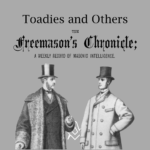 In the realm of Masonry, the principles of equality and respect are paramount. Yet, the presence of toadies—those who obsequiously seek favour from the influential—threatens these ideals. While Masonry embraces diverse beliefs and backgrounds, it rejects the sycophantic behaviours of toadies, flunkeys, and tuft-hunters, urging members to uphold genuine respect and self-worth. The Freemason's Chronicle - 22nd January 1876 |
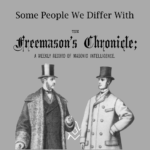 Unveiling the Unpleasant: Some People We Differ With Discover the intriguing dynamics of quarrels within the Masonic brotherhood. From the cantankerous to the litigious, the peevish to the vengeful, delve into the characters that challenge fraternal harmony. Explore their motives, temperaments, and the art of navigating disputes with these fascinating brethren. Brace yourself for a riveting journey into the world of conflicting personalities. |
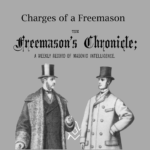 Unravelling the Masonic Mystique: A Deep Dive into the Freemasons' Charges - Explore the intricate world of Freemasonry, its principles, rituals, and the mechanisms for resolving internal disputes. Discover how this ancient fraternity fosters unity, promotes moral conduct, and upholds the sanctity of its secrets, while navigating the complexities of modern society. - The Freemason's Chronicle - 4 December 1875 |
 Unlock the hidden lessons of Masonic Studies! Don't settle for superficial knowledge or mere rituals. Discover the true depth and meaning behind Freemasonry. Expand your understanding of Tracing-Boards, Lectures, and more. Join regular Lodges of Instruction to enhance your Masonic journey. Become a knowledgeable Freemason, not just a token-bearer. Unleash the power of true Masonic wisdom today! |
 Uncover the incredible story of how Masonry saved the life of a Crimean War foot soldier in this historical and masonic account. Through the first hand experience of a soldier engaged in fierce hand-to-hand combat, witness the fateful encounter with a Russian Freemason that changed the course of his life. Learn how brotherhood and a deep dedication to the craft can lead to unforeseen and life-saving circumstances on the battlefield. |
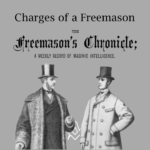 The Freemason's Chronicle - Charges of a Freemason The secrets of Masonry are the exclusive property of the Craft, and can never be communicated to one who is a mere labourer and not an accepted Mason. Hence, no labourer, that is, one who has not been regularly initiated in a legal Lodge. Article first published in The Freemason's Chronicle, 27 November 1875 |
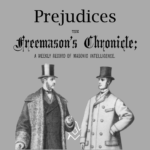 The Freemason's Chronicle - Prejudices Prejudices are partial judgments in favour of, or against certain persons or things, and, for convenience sake, may be ranged in two categories—those which are, comparatively speaking, harmless, and those which are harmful. Article first published in The Freemason's Chronicle, Oct. 2 1875. |
 The Freemason's Chronicle - Cliques Is Freemasonry - a Clique ? Man has been defined as a gregarious animal, but in his highly civilised condition he is gregarious only to a limited extent. First published in The Freemason's Chronicle, Oct. 2 1875, addresses the same challenges then as now. |
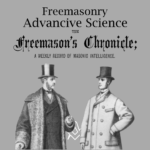 The Freemason's Chronicle - Freemasonry - an Advancive Science Is Freemasonry - an Advancive Science ? Not to confuse advancement with innovation. Has it been the case that Freemasonry's survival for 300 years plus is due to being an Advancive Science, tending to advance. First published in The Freemason's Chronicle 18 September 1875, addresses the same challenges then as now. |
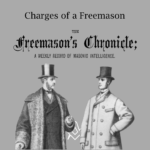 The Freemason's Chronicle - Charges Of A Freemason An interpretation of the "Charges of a Freemason", written Bro. Cornelius Moore and published in 1875, that introduce certain opinions that for some readers, will not sit well in contemporary times. - The Freemason's Chronicle, Sept. 11, 1875 |
 On The Order Of The Temple And Its Doctrine. THE Order of the Temple is divided into two great classes, denominated respectively the Order of the Temple and the Eastern Order. The Eastern Order gave birth to the Order of the Temple, and in the course of time has become an appendage of the latter. It is in ancient Egypt that we find the cradle of the Eastern Order. The Freemason's Chronicle, Sept. 4, 1875 |
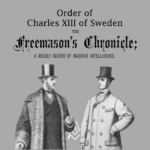 Order of Charles XIII of Sweden The following translation of the Manifesto of King JL Charles XIII of Sweden, on the occasion of his establishing the Masonic Order which bears his name, and of the Statutes of the said Order, may be interesting to our readers. The Freemason's Chronicle, Aug. 28, 1875 |
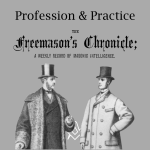 Most of our readers in the course of their experience, have doubtless met with enthusiastic brethren who take it for granted that a Mason can do no wrong. These enthusiasts are thoroughly convinced that the vast majority of those who join the Order are the most benevolent, the most moral, and the very noblest members of society. - The Freemason's Chronicle 10 July 1875 |
 An article investigating the relationship between masonry and citizenship. Are the principles of Freemasonry aligned with the freemason's claim to be a better citizen of the world? The Freemason's Chronicle - 19 June 1875 |
 A visitor must make clear his identity to the satisfaction of the Lodge he proposes to visit. More than once have we been asked to explain our views as to the reception of strangers in a Lodge. - The Freemason's Chronicle - 29 May 1875 |
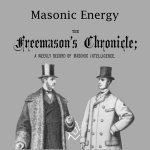 Is there reason in the accusation that Masonic energy looks only to a course of good feeds, when we can point to such grand results as have been achieved in these latter years, both in respect of the extension of our Order ? - 1May 1875 |
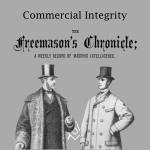 Implementing Freemasonry's peculiar system of morality in our day to day business affairs was the topic of this article, Commercial Integrity, first published in The Freemason's Chronicle - 8 May 1875 |
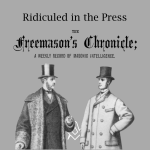 Ridicule has been somewhat illogically described as the test of truth. If it were so, Freemasonry ought to have perished long since. Two press reports from May 1875 covering the |
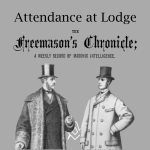 There are many things which Freemasonry will do for a man in the way of opening his mind and giving him larger and kindlier views of life, but Freemasonry itself, cannot eradicate the natural bias of the disposition. |
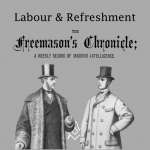 There is, we fear, too marked a tendency in very many Lodges to hasten through its labours, with a view to entering, as soon as possible, upon the business of refreshment. - The Freemason's Chronicle 17th April, 1875 |
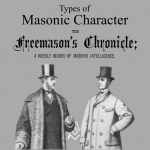 Another example that demonstrates that nothing really changes in Freemasonry. In an article the Types of Masonic Character published 145 years ago in The Freemason's Chronicle 10th April, 1875 |
 A brief history on the relationship between the British Monarchy and the craft - The Freemason's Chronicle 20th March , 1875 |
 What are the qualities of a convivial man and how does this dovetail perfectly in to Freemasonry ? 16th March, 1875 |
 A review of the "Sketch for the History of the Dionysian Artificers," a fragment, by Hyppoli to Joseph Da Costa - This little work may be regarded as, so to speak, the Holy Grail of Masonry. |
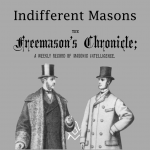 Nothing really changes, an article Indifferent Masons, From Le Monde Maçonnique 1874. Translation published in The Freemason's Chronicle 20th February, 1875 |
 In handling an intruder in the lodge, we endeavoured to show that a good Mason should be a gentleman, and a sincere man. The Freemason's Chronicle 20th February, 1875 |
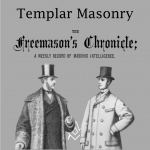 Templar Masonry - a historical aspect of the Religious and Military Order of the Temple published in The Freemason's Chronicle 13th February, 1875 |
 Secrecy perhaps the strongest objection urged by the enemies of the Masonic Order against its existence published in The Freemason's Chronicle 20th March 1875 |
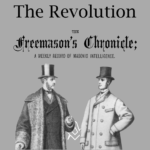 Freemasonry In The United States during And After The Revolution We take a look at Freemasonry in the United States during and after the Revolution first published in The Freemason's Chronicle - February 6, 1875 |
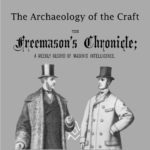 We take a look at the archaeological connection with the Craft, first published in The Freemason's Chronicle - January 30, 1875 |
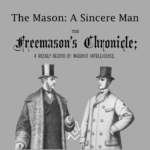 What it means to a Freemason to be a sincere man. Extract: first published in The Freemason's Chronicle - January 23, 1875 |
 What it means to a Freemason to be a citizen of the world ? First published in The Freemason's Chronicle - January 16, 1875 |
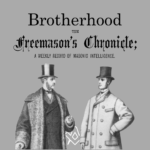 Brotherhood! In that one word what sympathetic associations arise. First published in The Freemason's Chronicle - January 9, 1875 |
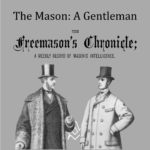 This opening article was written 145 years ago, yet it resonates with Freemasons today as it did then. First published in The Freemason's Chronicle, January 2, 1875, Issue 1 |
masonic knowledge
to be a better citizen of the world
share the square with two brothers

click image to open email app on mobile device



